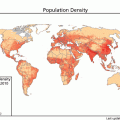Classification: ICD-9 086.2; ICD-10 B57
Synonyms: Chagas disease.
Agent: Trypanosoma cruzi, a protozoan, with a flagellate form in the bloodstream and an intracellular form without flagellum.
Reservoir: Humans and a wide variety of domestic and wild mammals, especially dogs, cats, guinea-pigs, rodents, and opossums.
Vector: Blood feeding reduviid bugs of the genera Triatoma, Rhodnius, and Panstrongylus. The most common vector in south America is Triatoma infestans. The vector lives up to 2 years.
Transmission: The vector defecates during feeding, and the infected feces are rubbed into the bite wound or conjunctivae, mucous membranes, or abraded skin; blood transfusion, organ transplant and shared needles. Congenital infection occurs in 2–8% of infected pregnancies. Oral transmission occurs by eating or drinking contaminated food or drink.
Cycle: 10–30 days in the vector after first infected meal, then 5–42 days in the reservior host.
Incubation period: 5–14 days after infected bite, 30–40 days after infected blood transfusion.
Clinical findings
Stay updated, free articles. Join our Telegram channel

Full access? Get Clinical Tree




